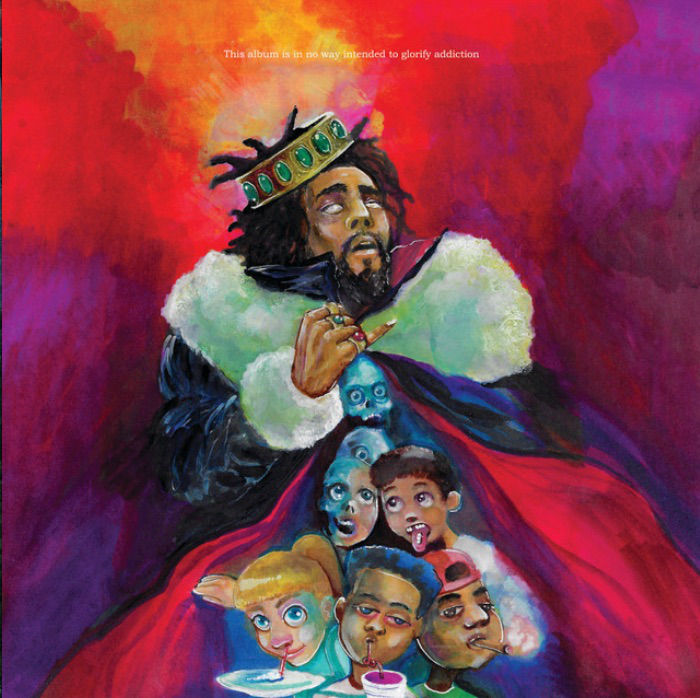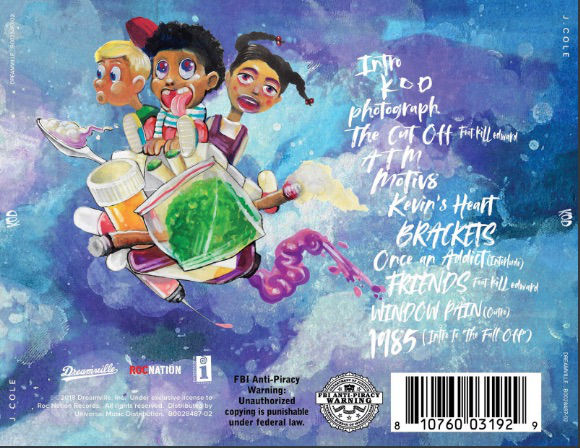J. Cole dropped a drug-dissing album on 4/20. Still, stoners everywhere were sparking up to those tracks that day.
Just a few hours before the album drop, Cole took to Twitter to explain the title in three different ways: Kids On Drugs, King Overdosed, and Kill Our Demons. This highly anticipated fifth album following his staggering success after his back-to-back platinum no feature albums marks another big moment for music in 2018.


J. Cole took the world by storm with 2014 Forest Hills Drive and 4 Your Eyez Only floored us again. With K.O.D, he emphasizes the fact that life brings pain, and it is up to us to choose how we deal with that pain. This album shines a light on today’s mumbling, pill-addicted rappers and reminds us why J. Cole took off so quickly. However, K.O.D is extremely reminiscent of Cole’s previous works and poses some questions: does putting out a mediocre album like this after back-to-back platinum albums lessen his value as a “conscious” rapper? is he essentially just remixing his old content and presenting it as new?
The intro track opens up the record with a rich, inspiring spoken word. Two women describe the pain that life brings and the contrast between laughing and crying. Listeners are advised to be conscientious of how they deal with the inevitable pain that life brings.
“KOD” is the second track and the title of the album. Naturally, I expected this to be the best song on the album. I was disappointed. It’s a less intense “G.O.M.D.” specifically in the first section, and he uses the beat from Ludacris’ “How Low.” Sure, Cole annihilated his verses about not needing many features to be successful and how he doesn’t appreciate all these fake people popping up now that he made it, but he literally references his hit from 2014 Forest Hills Drive: “How ’bout you just get the fuck off my dick?” One thing to appreciate about this song is the fact that his flexing is warranted. Rappers like Russ are out here spewing the same confident (in some cases, straight up egotistical) nonsense with not much to back it up. The rest of the song elaborates on Cole’s youth and the (drug) experiences from his environment that shaped him. The end of this song wraps into the intro track by listing off drugs and ending with “the strongest of them all: love.”
“Photograph” is the next song and is simply a more hardcore “She’s Mine Pt. 1.” I like the message he’s portraying with this song, though: “Love’s today gone digital and it’s messing with my health.” Today’s relationships that seek validation through social media and other’s opinions hardly ever last, and those based on digital interfaces tend to fizzle out quickly. Cole is tearing down the idea that you need others to notice and approve of a relationship in order for it to mean something. In reality, not showing that to your friends and keeping your love life to yourself results in a stronger relationship with less outside influence.
kiLL Edward hops on the album with tropical harmonies on “The Cut Off.” The contrast in this song is stunning; J. Cole raps with a collected surface about how he’s no longer taking shit from anyone and he knows now when he’s being used for fame, money, or anything else superficial. He so calmly speaks of how he wants to inflict pain on the people who have used him endlessly without offering anything in return. Like with any friend/relationship, someone’s true intentions will always rise to the surface with time. The most remarkable parts of this song were the beautiful female vocals.
“ATM” starts with something that I can only compare to a Kendrick song. It’s a slow, lowkey, creeping introduction that sounds straight off of To Pimp a Butterfly, specifically Kendrick’s “you, you, you, you,” in ‘The Blacker the Berry’ compared directly to Cole’s “count it, count it, count it, count it,” in this song. The first part of the song is bragging about his riches and how everyone told him he wouldn’t make it (hm, we’ve heard that before… many a time.) The second half does a 180 and educates about how money will ruin you, beginning with your character- “My Rolex is scorching.” You pay a hefty price to be financially well-off, especially in terms of fame, and it can eat away at you. The Kendrick soundalike wraps up the song with another TPAB outro.
I spent so long trying to figure out what the intro to “Motiv8” was from until I realized that it honestly didn’t matter. This song/album isn’t significant enough to make me wonder more. However, this song is a direct jab at the pill-popping teens of today: “My demons are close; I’m trying to hide. Popping a pill, I’m feeling alive.” It’s a rather boppy song, but like most on this album, it’s forgettable.
“Kevin’s Heart” is one of the best songs on this album, one for which Cole released a music video. You look at him differently at the beginning of the song because he shows up singing over a synth sound.. What kind of J. Cole showed up for this track? It seamlessly transferred into a consistently rhythmic classic beat. He examines his feelings of guilt as he faces temptation after temptation when it comes to love. He knows that he can certainly mess a good thing up, and he’s trying his best to shake how much he cares for this girl before they get in too deep. At the end of the day, no matter how hard he tries to block her out and how many other girls pass, it’s always her on his mind: “She’s got wife written all over.”
“BRACKETS” is another song that I’ll (probably) go out of my way to listen to even after the album hype died down. Starting with a comedy skit, the switch-up is huge as it eases into a slow, sad introduction. Cole expresses his distaste for the amount of conflict occurring over him as he’s not used to so much hate and so much support thrown back from friends, family, and fans. He speaks of the void he’s looking to fill before bringing back the classic high-pitched-voice-having-a-phone-conversation bit. The final leg of this track is a huge political statement: If all of our tax money is going towards programs to help us, why aren’t black people getting proper means to education? Why don’t we know where our money is going? Why is capitalism and history in our country so damn white? “One thing about the men that’s controlling the pen that writes history: they always seem to white out they sins.” While joking, he makes an interesting point when he mentions that it’s 2018; we should have the opportunity to be able to vote on issues and people from our iPhones. After all, this generation was found to be the biggest culprit in terms of not exercising their right to vote, and nothing makes a millennial happier than gluing their face to their phone screen.
My heart broke a little bit listening to “Once an Addict” and tears slid down my cheeks. Not only is this a beautifully personal song, but it hit far too close to home for me. Cole highlights his struggles growing up dealing with his mother’s addictions while trying to handle his own vices. His demons and her demons warring in a household all the time put immense strain on their relationship, and he’s torn between being devastated for her helplessness, furious at the way she took it out on him, and his guilt for feeling like he didn’t do enough to help her. “Something’s got a hold on me” is repeated throughout the song and identifies with K.O.D: kids on drugs; kids being diagnosed with mental illnesses/addictions and jumping right into medications. “There are many ways to deal with this pain… Choose wisely.”
“FRIENDS” is a direct call-out of Cole’s friends who struggle with addiction to different drugs. The chorus gives us their point-of-view: “I’m aggravated without it, my saddest days are without it… my database of narcotics is growing long.” He straight up says multiple names, blurring them out, and tells them that he hopes they are listening. He sees the strength in them and while trying to stay in his lane, he’s advising them that when they’re feeling like they need to use, just remember how strong they are. This is his cry out to his friends that he’s terrified of losing. “If you’re down to try it, meditate. Don’t medicate.”
The outro, “Window Pain” is an interesting note on which to end an album beginning with a young girl’s story of watching her cousin get shot. Cole creates a sense of vulnerability and expresses how grateful he is for everything he has accomplished. Like in “ATM”, he wonders if it’s worth it. Did he sacrifice too much? Was all the work he’s done really for nothing? The track slowly becomes more optimistic as the little girl explains how bad things happen because God is teaching everyone a lesson before he restarts the world. I found this interesting because there are several cases in which Cole is found addressing God in a chorus or verse, but this is the first time he has added something about religion/God to a song that wasn’t his personal contribution.
“1985” shouldn’t have been added to the end of this album. It’s such a weak song to finish on, especially placed after the outro. The calm, insignificant song seems very out of place. The beat is not diverse at all, and the entire track is monotone. Bleh ending.
Overall, I’d give this album a 5/10. Don’t get me wrong, there are definitely some bangers on here. However, there are only a handful of songs that I felt were worthy of being a product of J. Cole. Most beats were elementary, most lyrics were recycled from old albums, put in a blender, and spit back out, and the way the theme developed throughout the album was unimpressive. Yeah Cole, we know how far you made it. We know that you came from the bottom. We know you went double platinum with no features twice. We’re very impressed by this, but it seems like you’ve played all the cards in your hand. I was so excited when I heard the meaning of the title of the album, thinking he could really make an impact in today’s Trump-ridden society. There was much potential for this album as Cole was definitely on the right track with the idea, but the execution of the album was flawed.
RATING: 5/10